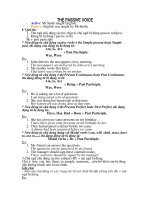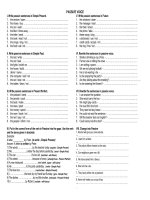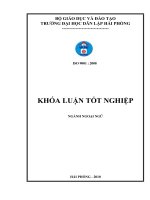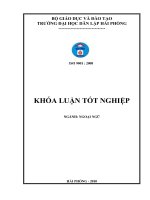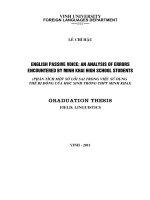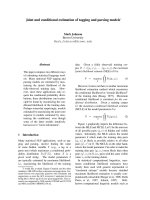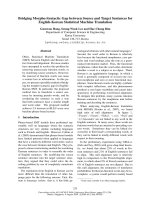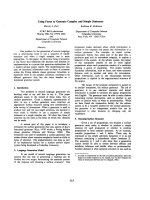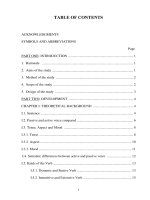passive voice and conditional sentences
Bạn đang xem bản rút gọn của tài liệu. Xem và tải ngay bản đầy đủ của tài liệu tại đây (204.94 KB, 5 trang )
<span class='text_page_counter'>(1)</span>LYÙ THUYEÁT OÂN TAÄP CÂU BỊ ĐỘNG, CÂU TƯỜNG THUẬT VÀ CÂU ĐIỀU KIỆN A. LÝ THUYẾT. I. Bị động Thì. Active. Passive. Vnguyeân maãu / V-s/es am / is / are + V3/-ed VD: She cleans the house every day. -> The house is cleaned every day. V2/-ed was / were + V3/-ed QKÑ VD: They broke the window. -> The window was broken. am/ is / are + V-ing am/ is /are + being + V3/-ed HTTĐ VD: He is telling a story. -> A story is being told. was / were + V-ing was / were + being + V3/-ed QKTD VD: She was making a cake. -> A cake was being made. has / have + V3/-ed has / have + been + V3/-ed HTHT VD: They have bought a book. -> A book has been bought. had + v3/-ed had + been + V3/-ed QKHT VD: We had built the house before 2000. -> The house had been built before 2000. will / would will / would V can / could + V0 can / could + be + V3/-ed khieám may / might may / might (nguyeân maãu) khuyeát must must VD: You must do this work. -> This work must be done. II. Câu tường thuật Câu gián tiếp là câu dùng để thuật lại nội dung lời nói trực tiếp. Khi chuyển sang câu tường thuật ta cần thay đổi chủ ngữ, tân ngữ, tính từ sở hữu, thì của động từ, trạng từ chỉ thời gian và nơi chốn 1. Những thay đổi khi chuyển từ câu trực tiếp sang câu tường thuật a) Đổi thì và các yếu tố thời gian HTÑ. Đổi thì. Đổi các yếu tố chỉ thời gian và nơi chốn Trực tiếp Gián tiếp Trực tiếp Gián tiếp V1 (s/es) - yesterday - the previous day/the day before V2 V2 - last night - the previous night/the night before had + V3 has/ have + V3 ago - before had + V3 am/ is/ are + Ving - that day was / were + Ving - today can - tonight - that night could + V0 will - tomorrow - the following day/the day after/ the next day would + V0 may - next year - the following year/the year after/ might + V0 must the next year had to have to - this - that had to had + V3 - these - those had + V3 - here - there - now - then b) Thay đổi về đại từ nhân xng, đại từ sở hữu và tính từ sở hữu: - I -> he/ she - we -> they - me -> him/her - us -> them - my -> his /her - our -> their - mine -> his /her - ours -> theirs - myself -> himself /herself - ourselves ->themselves - you/your -> chuyển theo người nghe.
<span class='text_page_counter'>(2)</span> 2. Các dạng câu tường thuật 1. Statement (lời nói) (thuoäc daïng caâu khaúng ñònh vaø phuû ñònh) said S1 (THAT) S2 + V (đổi thì) told + O Ghi chú: S1 là người nói; S2 là chủ ngữ của lời nói trực tiếp; O là người nghe (nếu có đề cập). VD: He said, “I like football.” → He said that he liked football. “Tom will fly to Paris next week,” said Miss Hoa. → Miss Hoa said that Tom would fly to Paris the following week. 2. Commands & Requests. (mệnh lệnh). to + V0 not + to + V0 Ghi chú: S là người ra lệnh, yêu cầu; O là người nghe. VD: She said to him, “Come in, please” → She told him to come in. “Don’t make noise, Tom” said the mother. → The mother asked Tom not to make noise. 3. Questions (caâu hoûi) if / whether asked + O/ (yes/ no question) S1 + wondered/ S2 + V (đổi thì) Wh-word wanted to know (wh-question) Ghi chú: S1 là người nói; S2 là chủ ngữ của lời nói trực tiếp; O là người nghe. VD: She said to me, “Will he come?” → She asked me if he would come. “Where do you live?” asked the foreigner. → The foreigner asked me where I lived. S. told/asked. O. III. Caâu ñieàu kieän Câu điều kiện có hai mệnh đề: MĐ phụ (hay MĐ điều kiện) bắt đầu bằng If, và MĐ chính (nêu lên kết qu¶). Cã 3 lo¹i c©u §K : Các loại câu điều kiện 1. Future possible (type 1) (cã thÓ x¶y ra ë hiÖn t¹i hoÆc t¬ng lai) If + S + V (HTĐ) …, S + will/ can/ may/ must...+ V0 … VD: If I have time, I will visit you. 2. Present unreal conditional sentences (Type 2) (Trái với thực tế ở hiện tại) If + S + V (QKĐ) …, S + would/ should/ could/ might + V inf. … Lưu ý:Trong M§ if cã “To be” th× dïng “Were” cho tÊt c¶ c¸c ng«i). VD: If today were Saturday, I could go to the beach. If I had time, I would write you a letter. 3. Past unreal conditional sentences (Type 3) (Trái với thực tế ở quá khứ) If + S + V (QKHT) …, S + would/ could/ might + have + V3 … VD: If I hadn’t lost my way, I would have arrived sooner. Ghi chú: Cách nối câu dùng câu điều kiện: - Cách xác định câu dùng làm mệnh đề điều hiện: + A so B - > If A, B + A because B - > If B, A - Cách xác định loại điều kiện: + Nếu câu cho sẵn ở thì hiện tại đơn thì câu viết lại dùng điều kiện loại 2. + Nếu câu cho sẵn ở thì quá khứ đơn thì câu viết lại dùng điều kiện loại 3. - Nếu câu cho sẵn ở dạng khẳng định (không có not) thì câu viết lại ở dạng phủ định (có not) và ngược lại. B. BÀI TẬP I. Viết lại các câu sau bắt đầu bằng từ cho sẵn. 1. They are building several new schools in our town. Several new school …………………………………………………….. 2. We have made great progress in industry, science and medicine. Great progress …………………………………………………….. 3. Sam killed a lion last week. A lion ……………………………………………………...
<span class='text_page_counter'>(3)</span> 4. You must hand in your report before the end of this month. Your report …………………………………………………….. 5. I had just finished the job when the factory closed. The job …………………………………………………….. 6. No one has opened that box for the past hundred years. That box …………………………………………………….. 7. Are you going to mail these letters soon? Are these letters …………………………………………………….. 8. The teacher corrects our exercises at home. Our exercises …………………………………………………….. 9. John said, “I want to attend a famous university.” John said …………………………………………………….. 10. “I’m looking for the book you gave me last week,” Mary said to Peter. Mary told Peter …………………………………………………….. 11. "I will get myself a drink," she said. She said …………………………………………………….. 12. "Peter, do you prefer tea or coffee?" she said. She asked …………………………………………………….. 13. The father said, “I was on a business trip the whole day yesterday.” The father said …………………………………………………….. 14. “My brother will get married next month,” James said. James said …………………………………………………….. 15. I said to my friend: “When did you buy your new car ? I asked …………………………………………………….. 16. Mike said to Henry, “Give me my book back, please.” Mike told …………………………………………………….. 17. He said: “Did you see Mary yesterday ?” He wanted to know …………………………………………………….. 18. He is very slow, so we won’t give his such an important task. If ………………………………………………………………………………………… 19. City life isn’t enjoyable because everything is very expensive. If ………………………………………………………………………………………… 20. Peter didn’t write to me so I didn’t write to him. If ………………………………………………………………………………………… 21. I can’t live in the country because I can’t find a job there If ……………………………………………………………….. 22. He was tired so he made a mistake. If ………………………………………………………………………………………… 23. She was ill so she didn’t go to work. If ………………………………………………………………………………………… 24. I don’t have a spare ticket so I can’t take you to the concert If I ………………………………………………………………... 25. It rained all morning so we didn’t go out. If ………………………………………………………………………………………… II. Choose the correct answer among A , B C or D. 1. She asked me where I_____________ from. A. come B. coming C. to come D. came 2. I asked Martha________ to enter law school. A. are you planning B. if she is planning C. was she planning D. if she was planning 3. Nam wanted to know what time _________ . A. the movie began C. the movie begins B. did the movie begin D. does the movie begin 4. Julia said that she ________ there at noon. A. is going to be B. was going to be C. will be D. can be 5. Paul asked her, “Have you got 20 pounds?” Paul asked her ________ 20 pounds. A. if she got B. if she had got C. whether she got D. whether had she got 6. He told me __________ him up at six o'clock. A. please pick B. to pick C. should pick D. I can pick 7. He said that Linda and John ________ married ________ ..
<span class='text_page_counter'>(4)</span> A. were getting / tomorrow B. are getting / the next day C. were getting / the next day D. will getting / the day after 8. They asked me when _________ . A. did I arrive B. will I arrive C. I had arrived D. I can arrive 9. The farmer said, “ I didn’t see her.” ---> The farmer said ____ her. A. he had seen B. I hadn’t seen C. she didn’t see D. he hadn’t seen 10. I wondered __________ the right thing. A. if I am doing B. was I doing C. am I doing D. whether I was doing 11. Charlie __________ that his father was in hospital. A. told me B. told to me C. said me D. asked me 12. Mr Brown said, “I watched TV last night.” -- -> Mr Brown said that he _______ TV the night before. A. was watching B. watched C. had watched D. has watched 13. The teacher said Columbus ________ America in 1492. A. discovered B. had discovered C. was discovering D. would discover 14. I would have visited you before if there _____ quite a lot of people in your house. A. hadn't B. hadn't been C. wouldn't be D. wasn't 15. If you had caught the bus, you _____ late for work. A. wouldn't have been B. would have been C. wouldn’t be D. would be 16. If I _____, I would express my feelings. A. were asked B. would ask C. had been asked D. asked 17. If _____ as I told her, she would have succeeded. A. she has done B. she had done C. she does D. she did 18. Will you be angry if I _____ your pocket dictionary? A. stole B. have stolen C. were to steal D. steal 19. You made a mistake by telling her a lie. It _____ better if you _____ to her. A. would have been / hadn't lied B. would be / didn't lie C. will be / don't lie D. would be / hadn't lied 20. John would be taking a great risk if he _____ his money in that business. A. would invest B. invested C. had invested D. invests 21. She wouldn't have given them all that money if we _____ her to. A. wouldn’t advise B. won't advise C. hadn't advised D. didn't advise 22. If the tree hadn't been so high, he _____ it up to take his kite down. A. could have climbed B. climb C. is climbing D. climbed 23. If the wall weren't so high, he _____ it up to take his ball down. A. climbed B. could climb C. is climbing D. climb 24. If I _____ her phone number, I _____ her last night A. had known / could have phoned B. knew / would have phoned C. know / can phone D. knew / could phone 25. If he ______ the truth, the police wouldn’t arrest him. A. tells B. told C. had told D. would tell 26. If you press that button what _____? A. would happen B. would have happened C. will happen D. happen 27. She says if she _____ that the traffic lights were red she _____. A. had realized / would stop B. realized / could have stopped C. has realized / stopped D. had realized / would have stopped 28. I am very thin. I think, if I _____ smoking, I might get fat. A. stop B. had stopped C. will stop D. stopped 29. If I _____ that yesterday, I _____ them. A. had discovered / would inform B. had discovered / would have informed C. had discovered / could inform D. discovered / can inform 30. If you _______ to the course regularly, they ________ a certificate last year. A. go / gave B. go / give C. had gone / would have given D. went / would give 18. I think he is not at home. If he _____ in, he ______ the phone. A. was / answered B. were / would answer C. were / would have answered D.had been / would have answered 19. If I ______ in London now, I could visit British Museum..
<span class='text_page_counter'>(5)</span> A. were B. had been C. have been D. would be 20. If Columbus _______ money from Queen Isabella, he _______ across the Atlantic. A. do not receive / could not sail B. had not received / might not have sailed C. did not receive / might not have sailed D. would not receive / might not sail 14. “Please don't tell anyone what happened," Ann said to me. A. Ann said to me please don't tell anyone what happened. B. Ann told me didn't tell anyone what had happened. C. Ann said me not to tell anyone what happened. D. Ann told me not to tell anyone what had happened. 19. “ Stay in bed for a few days," the doctor said to him. A. The doctor said to him stay in bed for a few days. B. The doctor said him to stay in bed for a few days. C. The doctor told him to stay in bed for a few days. D. The doctor told to him stay in bed for a few days. 21. Mary said, “I want to give up my job.” -> Mary said that ........................... A. she wants to give up her job. C. she wanted to give up my job. B. I wanted to give up her job. D. she wanted to give up her job. 22. His wife said to him, “ write to me as often as you can” A. His wife told him to write to her as often as he can B. His wife told him to write to her as often as he could C. His wife told him writing to her as often as he can D. His wife told to him to write to her as often as he could 23.Mary said ,”I have not seen Peter since last month .” A. Mary said she has not seen Peter since the previous month. B. Mary said she had not seen Peter since the previous month . C. Mary said she was not seen Peter since the previous month. D. Mary said she doesn’t see Peter since the previous month 24. “ I want to go on holiday but I don’t know where to go.” ---> Tom said that _______________ A. he wanted to go on holiday but he doesn’t know where to go. B. he wants to go on holiday but he didn’t know where to go. C. he wanted to go on holiday but he didn’t know where to go. D. I wanted to go on holiday but I didn’t know where to go. 25. Mary said : “ What will you do this evening, John ?” A. Mary asked John what would he do that evening. B. Mary asked John what John did that evening. C. Mary wanted to know what she and John would do that evening. D. Mary wanted to know what John would do that evening. 26. He said to them, “Don't tell me such a nonsense!” A. He told them not to tell him such a nonsense. B. He told them to tell him such a nonsense. C. He told them not to tell them such a nonsense. D. He told them to tell them such a nonsense. 30. “Please don’t leave until I come back,” Sarah said. A. Sarah told us do not leave until she comes back. B. Sarah asked us do not leave until she came back. C. Sarah told us not to leave until she came back. D. Sarah said to us not to leave until she comes back 34 . “I’ve been playing tennis a lot lately," John said. A. John said that I have been playing tennis a lot lately. B. John said that he has been playing tennis a lot lately. C. John said that he had been playing tennis a lot lately. D. John said that she had been playing tennis a lot lately. 36. “I don't know what Fred is doing," said my sister. A. My sister said that she didn't know what Fred was doing. B. My sister said she doesn't know what Fred is doing. C. My sister said that I don't know what Fred is doing. D. My sister said that she hasn't known what Fred was doing.
<span class='text_page_counter'>(6)</span>
